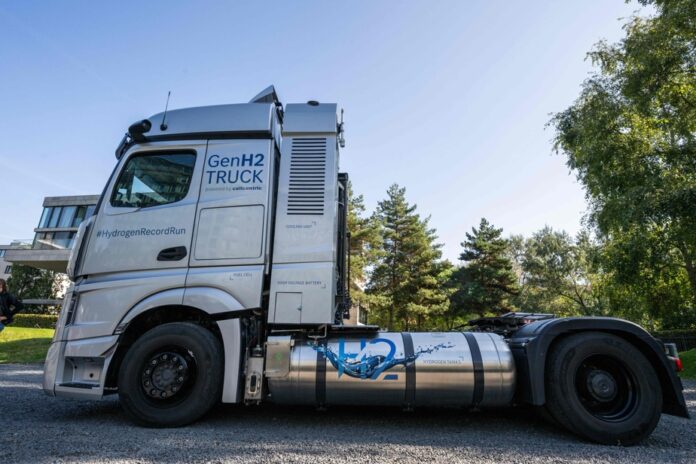(Berlin) When the heavy goods vehicle advances into the heart of Berlin, no engine noise drowns out the applause: the vehicle is powered by hydrogen and has broken an autonomy record which highlights the potential of this carbon-free technology .
World leader in truck production, Daimler Truck delivered a show of force this week by driving its “GenH2” prototype 1,047 kilometers.
Between the group’s factory in Wörth am Rhein, near the French border and the German capital, the vehicle made the journey with a single charge of hydrogen, an autonomy record, according to the German manufacturer.
“You prove that a heavy load can be transported over a long distance sustainably,” greeted Petra Dick-Walther, State Secretary of the Ministry of Economic Affairs, as the truck departed.
But before road transport converts to this technology, numerous obstacles remain, between lack of infrastructure, hydrogen resources, costs and technical challenges.
Series production is hoped for “the second half of the decade,” explains Andreas Gorbach, responsible for truck technology at Daimler Truck.
Several conditions must be met, he recognizes: “the first is the infrastructure of hydrogen charging stations, the second is economic viability for our customers thanks to the availability of green energy at a competitive cost”.
The hydrogen fuel cell has a reduced environmental impact, only emitting water vapor when the diesel used by heavy goods vehicles pollutes massively. It still has to be green hydrogen – produced from renewable energies – the production of which is currently marginal.
The development of hydrogen trucks is therefore less advanced than that of battery-powered heavy goods vehicles, of which Daimler, like the Swedish Volvo, already manufacture examples.
From the German manufacturer’s point of view, the two technologies are complementary. Advantage to batteries for lighter loads and short distances, while hydrogen would be reserved for long distances and offers a much shorter recharge time.
“To decarbonize transport, we will need both,” believes Andreas Gorbach.
European manufacturers are under pressure due to the tightening of standards, even if the objectives are less strict than for passenger cars.
A 2019 European Commission regulation requires a 30% reduction in pollutant emissions from trucks by 2030. A new proposal suggests reaching a 90% reduction, compared to 2019 levels, for new trucks in 2040.
Added to this is competition from international manufacturers, such as Tesla or the Chinese industrialist BYD, also engaged in the electric conversion of trucks: European manufacturers “could lose 11% of the heavy goods vehicle market share by 2035” on the Old continent if they do not green their ranges quickly enough, according to a recent study by the European Federation for Transport and the Environment (T
The American start-up Nikola, a customer of the German equipment manufacturer Bosch, has already started mass production of its hydrogen-powered heavy goods vehicle model across the Atlantic, taking advantage of public purchasing subsidies as part of the Inflation Reduction Act of the Biden administration. As of August, it claimed a total of 202 orders placed by 18 customers.
Hydrogen will only make a breakthrough if its costs can come down, experts warn.
For now, Daimler Truck estimates the cost price of its battery-electric models at around 2.5 times that of an equivalent diesel model.
Concerning hydrogen, it is impossible to do the calculation, because the charging infrastructures are… non-existent.
Daimler has joined forces with several truck manufacturers and energy suppliers (Shell, BP, Total) in Europe and North America to develop a network of hydrogen charging stations.
The network should materialize “at the end of the decade”, assures Rainer Müller, manager at Mercedes Benz Trucks, one of the brands of the Daimler group, which is aiming for a cost of using hydrogen trucks “similar” to that of a diesel truck.
But others are less optimistic. According to the projections of T

